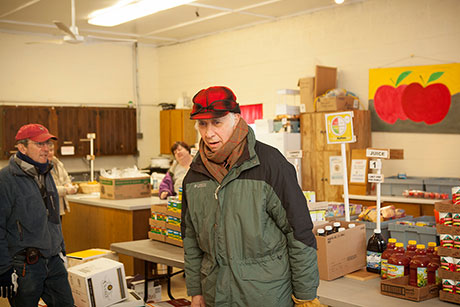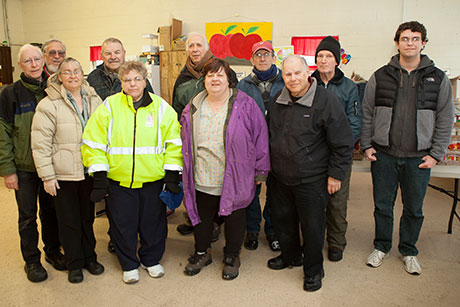Hatch: Food pantries combat food insecurity on many levels
By Nancy Doolittle


On one of the coldest winter days of the season, some 20 volunteers gathered at the Brooktondale Community Center Feb. 16 to distribute bread, meat, canned goods, household goods and other foods through the Caroline Food Pantry to about 250 area residents.
One of those volunteers is Marty Hatch, emeritus professor from Cornell’s Department of Music. Four or five others also have Cornell affiliations, either as current faculty or staff, or as retirees.
“When you become part of a community such as Caroline or Brooktondale, you realize how closely people are knit together and how intertwined our actions are,” Hatch said. “You realize, for instance, that giving to the food pantry is much bigger than giving individuals the means to have another meal. It is about assisting people with basic needs, so that they can move forward in other ways.”
The United Way’s Hunger and Food Security Campaign promotes that community interconnectedness, he said, as its contributions go directly to local food pantries, the Friendship Donations Network, the Food Bank of the Southern Tier and many others dealing with hunger and food security.
Together, these groups not only feed the hungry, but also “help the environment and local economy by supporting local farmers; promote good health by distributing safe and nutritious food; and further sustainability efforts by redistributing food that might otherwise be thrown away,” Hatch said.
Hatch first became interested in questions of local food production, and food safety and security, when he and his wife, Susan, bought part of a farm in 1972 and started growing vegetables and raising sheep. In the late-1990s, they offered some of their land and time to a community-supported agriculture (CSA) operation, which they continued until 2010. The CSA sparked their interest in community food distribution issues.
How to support the Hunger and Food Security Fund
Cornell has embarked on a special fundraising Hunger and Food Security Campaign through March 31 as part of its United Way campaign to address the growing hunger crisis in Tompkins County and the surrounding area. Your contribution – no matter how small – will make a difference. To contribute to the Hunger and Food Security Fund, go to https://www.givegab.com/centers/united-way-of-tompkins-county/campaigns….
“We soon became involved in both growing some food for and helping with distribution of food at the Caroline Food Pantry,” Hatch said. More recently, Hatch took on the job of ordering food each week from the Food Bank of the Southern Tier for the pantry.
These activities have given Hatch a sense of the broad picture of food insecurity in the local area, and of the ways in which the different agencies work together to combat it.
“Knowing where you are begins with knowing the needs of and opportunities for service in your community,” he said.
Sponsored by the not-for-profit Martin Music Ministries, Inc. (John and Dody Martin), the Caroline Food Pantry receives about 70-80 percent of its food through the Food Bank of the Southern Tier. It also receives food through the Friendship Donations Network, which serves as a clearinghouse to coordinate the pick-up of food from local supermarkets and Cornell Dining that is safe, clean and edible but would otherwise be thrown away, and deliver it to around 20 area food pantries. The Caroline Food Pantry also targets some of its monetary donations so it can offer local farm produce in season.
“I support the United Way of Tompkins County because it understands these interconnections; it takes a holistic approach to the community, supporting a wide range of agencies and boosting its support to specific areas when the need in that area becomes especially critical,” Hatch said.
Media Contact
Get Cornell news delivered right to your inbox.
Subscribe